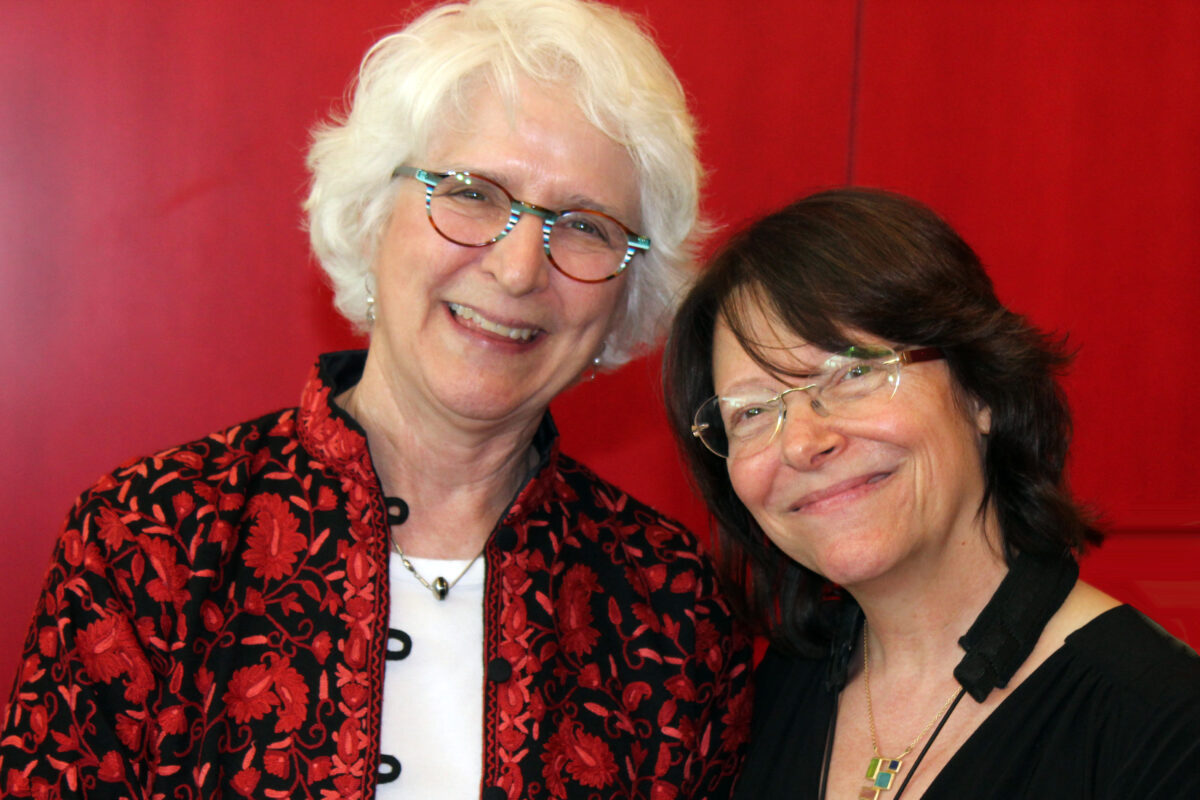As a high school student, Pam Voulalas ’24 was an aspiring clarinetist, determined to major in music and secure a position in a major symphony orchestra. But, on learning how infrequently symphony positions become available, she put down her clarinet. For 37 years.
Instead, she embarked on a career in the sciences, earning a Ph.D. and joining the faculty at the University of Maryland School of Pharmacy. Now, decades later, she returned to school, and graduates this week with a B.A. in music from UMBC.
Q: What was your career path in the sciences?
A: My Ph.D. studies were focused on synaptic plasticity in the brain—how the brain physically changes in response to exposure to novel stimuli.
When you’re exposed to something new, the brain processes that incoming information, creating a physical network that underlies long-term memory storage and retrieval. An important part of this network is an area of the brain called the hippocampus—the seat of learning and memory—which acts like a relay station. I was focusing on that part of the brain, trying to understand how different neurotransmitters interact with each other through their receptor systems to cause short-term stimuli to be transformed into long-term memories.
After completing my Ph.D. I went on to work as a postdoctoral fellow at the National Institutes of Health and Johns Hopkins School of Medicine before I then landed at the University of Maryland, Baltimore as a senior fellow (while I had three kids!). Later I joined the faculty in the School of Pharmacy there.
Q: What prompted you to leave your career and enroll in an undergraduate music program?
A: That was a sort of series of unexpected life events. I was collaborating with another researcher on a project studying plasticity in chronic neuropathic pain, and the funding was running out. Meanwhile, my husband and I both had parents with serious health issues, so I took what I thought was going to be a leave of absence to care for them. But I was also at a point where I was feeling like I was ready for a change, ready to move away from academic research.
During that period, I wanted to take a class in music theory at Howard Community College, but I learned that I couldn’t just take one class, I had to take three: theory, ear training, and piano keyboard skills. I thought I would just take the theory class, sign up for the other two, and drop them! Two years later I finished at HCC with an associate’s degree in music performance and my husband then asked me, “Are you going to finish this?” So I applied to UMBC.
(Video courtesy of Voulalas, Massey, McKibben, Sorrells, and the UMBC Department of Music)
Q: Why music composition?
A: As a scientist, I was very interested in the tiny details of brain function, down to the molecular level: what is learning and memory all about? What is the pathology of these processes? What does that look like? How does that work? In music, I think that composition was a purposeful choice of mine—it makes sense because I like learning about, if you will, the mechanics of music, the finer details.
I chose composition because I initially wanted to compose for clarinet ensembles. In 2016, I had picked up my clarinet again and joined the local community band. Within that group I found a bunch of interested clarinetists, and with them I formed a clarinet choir. We were together for about two years before COVID-19 hit. We performed at a few senior living communities and rehab centers, when it struck me that I could combine my musical skills with my knowledge of learning and memory and how to keep our neural circuits healthy throughout our lives.
As I got back to studying clarinet, I took lessons with people who were 70 to 85 years old who were still amazing players. I started thinking that a practical application of my love and interest in music would be to establish programs at senior living communities—places where people are still living independently and may still be playing or want to play their instruments. I could help them form ensembles on site, ideally leading to a performance. And that way they’re not just listening to music, they’re actively engaging—which is great for our brains—it’s great for everyone’s psyche, and it’s great for other residents to enjoy.
Q: You returned to school after a successful career in the sciences. What was it like being around other students who were so much younger than you?
A: Well, I was very nervous about transferring to UMBC. One of the players in my clarinet choir was a retired nurse, and she and I did the program together at HCC. I’m happy to say that both at HCC and also at UMBC, I never felt like I was playing the mother or the parent to younger students.
In fact, I feel like I added something to the classroom because, for example, some students can be timid about asking questions and putting themselves out there. I feel like I helped to be a role model for them, helping them by breaking the ice in certain circumstances.
I was just telling a friend of mine at lunch that I’ve had UMBC students want to hang out and talk, which I do feel has been pretty genuine. I can’t really explain that. I do believe that there is something special about the students who come to UMBC. I think this place attracts very open-minded individuals.
Q: At UMBC, who has been a mentor to you, or who has supported you in your work?
A: Who wasn’t a mentor?! I spent the most time with Dr. Linda Dusman, and then the three large ensemble directors, Dr. Philip Mann (Symphony Orchestra), Dr. Brian Kaufman (Wind Ensemble), and Dr. Patrick Crossland (New Music Ensemble). I had never had the opportunity to play in an orchestra before coming to UMBC! The very first person I connected with for orchestra was Dr. Nell Flanders, who was the orchestral director my second semester here. I was incredibly excited to be able to play orchestral repertoire. All of the faculty take their students seriously, setting the bar high. I love that. I love how the professors, every one of them from Dr. Airi Yoshioka to Dr. Lisa Cella, all push in a very gentle, supportive way. And I think this takes a lot of finesse—to encourage without completely stressing students out.

(Image courtesy of Voulalas)
Q: As an undergraduate composition major, you had your works performed by professional ensembles that visited UMBC, including the Bergamot String Quartet and the Strata ensemble. That must have been an unusual experience.
A: That is one of the huge gifts and the glorious insights and understanding that Dr. Dusman has given to her composition students. And that’s another thing that I think really elevates the composition program here—that we do have those opportunities to write music for people who have the skills to be able to attack more complex pieces.
That’s a wonderful feeling—when you can compose something challenging knowing that the ensemble will be able to handle it. It’s both exciting and a little intimidating, because you’re hoping you’re going to write something that the musicians enjoy playing. And then when it all works, it’s magical, something being brought to life, very surreal.
Q: Out of the works you composed during your time at UMBC, is there one that stands out for you?
A: I have to say that two pieces stand out. One was this piece that I call my “sleep piece” entitled To Sleep, Perchance to Dream. The assignment was to compose a piece based on a graphic score. That was challenging, but it was also fun because I ended up tapping into my neuroscience background to develop the idea. It demanded improvisation, which is not something that I had ever done before. I felt like I grew a lot with that experience, because I needed to compose in a very different way. And since I was also a member of the ensemble in that case, I had to learn how to feel comfortable improvising. It ended up being a multimedia piece, so that was more complex than anything I had tackled before. The successful performance of that piece was very gratifying.
With improvisation, there are moments when a special kind of cohesion occurs which is very different from playing standard notation repertoire—you hope that the ensemble will reach its optimal cohesiveness during the performance. Of course, with improv, you just never know how it’s going to go! When it works well it is a wonderful feeling.
The other piece that was probably the most challenging was Phaistos, in which I had to interpret an ancient artifact—a series of hieroglyphics arranged in a spiral pattern—and compose a piece based on that. It was technically very demanding, but in the end, incredibly gratifying, especially given that the Strata trio did a fabulous job interpreting it. Those are the two standouts for me.
(Video courtesy of Voulalas, the Bergamot String Quartet, and the UMBC Department of Music)
Q: This semester, as a member of UMBC’s New Music Ensemble, you performed Mauricio Kagel’s Staatstheater, a piece that features all sorts of theatrical gestures, many of which are intentionally absurd. What was that like for you?
A: Well, when Dr. Crossland first proposed it, we students were looking at each other like, “Okay….” Before I started this program, I loved all sorts of music. My husband and I have a collection that spans medieval and renaissance music, classical, jazz, minimalist, folk, rap, and a little bit of new music. But as far as really new music, very contemporary music, I hadn’t had a lot of exposure to that, and so it was very uncomfortable and foreign to me. I would put like the Kagel piece into that category, which ended up being both fun and enlightening.
One of the most interesting things that occurred to me as a student—and I was kind of warned by a student who graduated a year before me that this would happen—is that you come in as a mostly classically focused tonal person and then something happens, and your brain opens up to new musical possibilities. And I’ll never forget the moment when that happened. I was in my kitchen making breakfast, listening to the radio, a classical station, when I suddenly had this realization: This classical music was wonderful, but it’s not enough. Right? There’s so much more that can be done with instruments and music and sound. I feel like it was really then that this concept gelled for me. It was a very cool moment.
Q: What’s next for you?
A: I have a lot of experience writing grants for scientific research, and I’ve had some opportunities to do that for free for arts organizations and been very successful with that.
I’ve had a glorious career in science, but now I really am trying to focus on what kinds of work I can I do that will allow me to give back in one way or another—something that will have a lot of meaning for me and others while at the same time allowing me time to compose, because I have a lot of ideas for pieces I’d like to write for all kinds of different ensembles. And I do intend to keep studying. If I had the opportunity for advanced study in composition, I would like to do that.
I really would like to find ways to engage seniors citizens in music making. Aside from that, I have a dream to create a small, very intimate chamber space in Howard County, where we can present concerts of all genres of music performed by professionals and amateurs, including young students. Music is very big in Howard County—kids of all ages are achieving great things with their music. So that’s my dream—we’ll see!
(Video courtesy of Voulalas, Strata, and the UMBC Department of Music)
Q: Is there anything we missed?
A: I’m so in awe of and grateful for the faculty and the staff in the music department—every single one of them. I come from a field where it’s tough, the pressure is high, which can negatively affect the work environment and personal interactions, right? I know that a career in the arts is tough too. Maybe in a conservatory there’s a very different feel, but however the music department at UMBC manages to achieve it, I feel like they absolutely strike the right balance here.
And I know this sounds corny, but I feel so appreciative of the students here who I believe really accepted me as one of their own. I’m very grateful for that.
Tags: CAHSS, Class of 2024, Music




